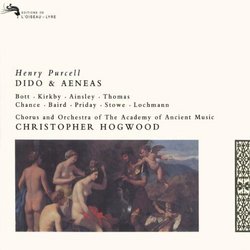The Version to Have - available from amazon.fr !
Terry Serres | Minneapolis, MN United States | 09/01/2004
(5 out of 5 stars)
"Hogwood's conducting may seem bland next to the interventionism of Haim and Jacobs. He passes on the use of winds, for example, and his use of theorbos is more madrigalesque than the vigorously-strummed interludes we get in the other two recordings. But Hogwood's playing has grace and clarity, and élan and lilt at all the key moments. Hogwood's faith in his singers and his sensitivity to the course of the drama leave one wanting for nothing in excitement. The orchestra is slightly recessed next to the vocal layer, but the vocal lines are so clear and clean that the orchestra never melts away. The playing is polished, almost polite, but it gives the singers room to reveal their characters ... although the less robust orchestra means that you do get a lot of the background tinkling from the harpsichord. The clean sound is enhanced by a sonic ambience less reverberant than the church acoustics we often get.
Hogwood's confidence in his singers is entirely earned and rewarded. The caviar casting gives us Emma Kirkby -- a worthy Dido herself under Parrott -- in the secondary role of Belinda, and the American early music star Julianne Baird as the Second Woman. Catherine Bott as Dido is second to none, delivering a bracing, committed, quicksilver performance. Three early music divas with three distinct voices -- Bott metallic, Kirkby reed-like, and Baird cushiony. They dialog and blend exquisitely, their crystalline utterances making every line of the drama tell. Bott is ablaze in the final confrontation with Aeneas and you witness that flame smolder mournfully until extinguished in the final strains of her lament.
John Mark Ainsley is a strong-voiced, handsome-sounding Aeneas. His soliloquy after the Spirit's visit succeeds in giving his personality some profile. Two vocal novelties are introduced: The bass David Thomas as the sorceress is less grotesque than you would expect, and ably abetted by his enthusiastic witches -- as usual, Thomas is adept at drawing a realistic character and not relying on orotundity. And then Hogwood uses a treble to toss off the sailor's song at the beginning of Act III, certainly a bit of insouciance, and so fitting in context, but no revelation. More successful is the elegant countertenor of Michael Chance in the role of the Spirit, certainly the best of the lot on record. I find his voice even more attractive than that of David Daniels, although he has less range in musical genres.
The individual strengths are many, but it's the ensemble of vocal, instrumental, technical, and interpretive virtues that make this the most memorable Dido on disc. The accomplished and varied playing, the sure-footed trajectory set by the conductor, the clear textures woven by the voices, the subtle choruses, the honest vocal acting and ensemble work, the well-integrated storm effects (I believe the machinery from Drottningholm was used), and the unfussy acoustic all contribute to a peerless production.
There are some operas that I am glad to have numerous recordings of (Pelléas, for one) and others (Wozzeck) where one recording stands head and shoulders above all others. Despite the fact that there are many successful recordings of Dido and Aeneas (another favorite being Leppard's with Jessye Norman), this is the recording I always return to, the one that speaks the truth to me of this opera and its timeless story."
One of the most exciting opera recordings ever!
G. BARTO | Los Gatos, CA | 10/14/2004
(5 out of 5 stars)
"When you pick up an opera recording, you should be getting something fun or moving and exciting. This is, after all, about the most expressive art form we have. But too often, you get something stuffy by people who act as if opera is so fragile that if they aren't careful they might break it. This recording is the exception. From Dido's laments to the witches' cackling to wavering Aeneas' cares, everything is true and beautiful. If you want to marvel at Purcell's craft, there are other recordings, but if you want to feel like the story is taking place in front of you with superb storytellers going back to a traditional telling, this is a must have."
Pure like the spring water in the mountains!
Armindo | Greece | 08/07/2004
(5 out of 5 stars)
"
This recording proves that baroque opera and ancient music is blooming today! We'll probably never find out exactly how Dido and Aeneas originally sounded but Hogwood here clearly has done a wonderful effort!
Bott might not erase the memories of Baker in this role but she's certainly a remarkable Dido. I was immediately struck by her crystal-clear, beautiful high mezzo voice and heartfelt singing. Ainsley has a warm, yet heroic tenor voice ideal for Aeneas. Little can be said about Kirkby who is the leading baroque soprano of our times. Her own Dido is equally great as her Belinda here.
The choice of a bass as the Sorceress sounds rather bizarre but according to the detailed accompanying booklet it is historically correct. In any case David Thomas copes well with his role's demands. The same goes for the choice of a boy as the first Sailor. The role of the spirit is luxuriously cast with Michael Chance experienced in these supernatural countertenor roles. Special praise must be given to the Chorus and Orchestra of the Academy of Ancient Music for their perfect performance.
The set is certainly pricey but the performance of Purcell's masterpiece stupendous!
"


 Track Listings (34) - Disc #1
Track Listings (34) - Disc #1
